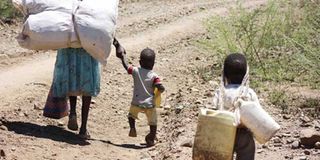Why regional security is Kenya’s job

A woman and her children flee to safety after bandits attacked and killed three people at Chemoe in Baringo North on April 23, 2015. PHOTO | CHEBOITE KIGEN | NATION MEDIA GROUP
What you need to know:
- Jihadists benefit directly from refugee camps’ readily available receptive youth, who transform into militants with ease.
- Kenya has taken on a leadership role in the fight against terrorism, stabilisation of Somalia and South Sudan, and regional infrastructure development.
- Jihadists benefit directly from refugee camps’ readily available receptive youth, who transform into militants with ease.
Every region in the world has a geopolitical Big Brother.
In East Africa, that title falls on Kenya, not just because of the size of its economy, but also the amount of money it pumps into national defence and security.
Reports from databases such as the IMF’s World Economic Outlook, Global Fire Power and Stockholm International Peace Research Institute (SIPRI), portray Kenya as the leader in East Africa.
In terms of political economy, Kenya leads and is rated stable with 1.5 per cent of its GDP going to defence expenditure.
SECURITY SPENDING
As a ratio of GDP, this security budget is double that of Ethiopia and South Sudan, and dwarfs those of Tanzania (1.1), Uganda (1.2) and Burundi.
This security spending should translate into something, because, as Sir Winston Churchill once said: “The price of greatness is responsibility.”
Kenya has also taken on a leadership role in the fight against terrorism, stabilisation of Somalia and South Sudan, and regional infrastructure development.
But if history is anything to go by, Kenyans ought to be reminded about the negative payoffs of altruism.
REFUGEE CAMPS
Kenya is home to four of the largest refugee camps in the world --- Kakuma; Hagadera, Dagahaley, and Ifo in the Dadaab complex.
The UN High Commissioner for Refugees puts the refugee population at more than 300,000.
But that comes with risks. Refugee camps around the world have often turned into de facto extremist governments, harbouring terrorist groups and facilitating their mobility.
BENEFIT DIRECTLY
Jihadists benefit directly from refugee camps’ readily available receptive youth, who transform into militants with ease.
Kakuma and Dadaab are no exception to the patterns observed in Ain Al Hilweh in Lebanon, Oberhausen and Wuasdorf in Germany, Zaatari in Jordan, and also in Turkey, France, Spain, Pakistan, India.
A majority of refugees are innocent men, women and children escaping persecution and war, while some are victims of the common neoliberal promise and axiom, ‘greener pastures’.
In Kenya, the only hindrance to the extremist groups is the distance between Kakuma and Dadaab camps, strengthened by the strong presence of security agents.
NON-STATE ACTORS
Violence waged by a large group of non-state actors often spills into adjacent states, if not effectively contained at its origin.
Ugandan Joseph Kony’s Lord’s Resistance Army operates in Central Africa Republic, Democratic Republic of Congo, Uganda, and South Sudan and Al-Shabaab terrorists have carried out attacks in Kenya, Uganda, Tanzania and Ethiopia.
Audrey Cronin, a professor of strategy at the US National War College, warns that civil wars that incorporate terrorist tactics are the most challenging to deal with.
Traditionally, counter violent extremism policies are centred on the idea of targeted killing of group leaders or arresting of members.
YIELDED SUCCESS
However, an evaluation of the two approaches highlights the former as being the only approach to have ever yielded success.
Despite the deaths of most leaders of terror groups, their organisations are still alive and active.
Conversely, humiliation resulting from arrests has proved to be a success.
Perhaps the strategy that seems to be gaining success is the deradicalisation of militants or foreign fighters returning to their home countries.
SIGNIFICANT RESULTS
This is slowly yielding significant results in some centres in Kenya, Saudi Arabia, Europe and the US. Kenya should focus on keeping its borders secure, Somalia stable and the region terror-free, drawing lessons from the rest of the world.
If it fails or falters in that leadership role, then the whole region is at risk of becoming a terrorists’ playground.
Mr Weku is a doctor of liberal studies student at Southern Methodist University, Texas. [email protected]





